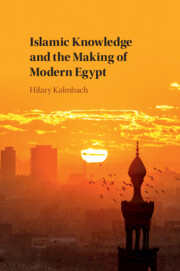Book contents
- Islamic Knowledge and the Making of Modern Egypt
- Islamic Knowledge and the Making of Modern Egypt
- Copyright page
- Dedication
- Contents
- Figures
- Acknowledgements
- Preface
- Notes on Transliteration and Use of Arabic
- Introduction: Hybridity, Islamic Knowledge, and ‘Being Modern’ in Egypt
- 1 Reform, Education, and Sociocultural Politics in Nineteenth-Century Egypt
- 2 Dar al-ʿUlum: Hybridity, Education, and Sociocultural Change, 1871–1900
- 3 Hybridity, Islamic Knowledge, and the Formation of Egyptian National Culture, 1882–1922
- 4 Fighting over the Future of Egyptian National Culture, 1923–1952
- Conclusion: Authority, Authenticity, and Revolution
- Book part
- Bibliography
- Index
2 - Dar al-ʿUlum: Hybridity, Education, and Sociocultural Change, 1871–1900
Published online by Cambridge University Press: 02 October 2020
- Islamic Knowledge and the Making of Modern Egypt
- Islamic Knowledge and the Making of Modern Egypt
- Copyright page
- Dedication
- Contents
- Figures
- Acknowledgements
- Preface
- Notes on Transliteration and Use of Arabic
- Introduction: Hybridity, Islamic Knowledge, and ‘Being Modern’ in Egypt
- 1 Reform, Education, and Sociocultural Politics in Nineteenth-Century Egypt
- 2 Dar al-ʿUlum: Hybridity, Education, and Sociocultural Change, 1871–1900
- 3 Hybridity, Islamic Knowledge, and the Formation of Egyptian National Culture, 1882–1922
- 4 Fighting over the Future of Egyptian National Culture, 1923–1952
- Conclusion: Authority, Authenticity, and Revolution
- Book part
- Bibliography
- Index
Summary
This chapter introduces Dar al-ʿUlum, a hybrid school founded in 1872 to train students from top religious schools such as al-Azhar to teach primary school subjects and Arabic within state-run civil schools. First, it locates Dar al-ʿUlum within the history of Egyptian teacher training. It explains how Dar al-ʿUlum formalised and expanded the path followed by reform-minded shaykhs since the early nineteenth century by providing a crash course in the subjects and habitus of the Egyptian civil school system, alongside advanced training in how to apply their specialist knowledge of Arabic and Islamic disciplines to teaching in a civil school. It then presents Dar al-ʿUlum as a hybrid institution whose mission was to bring religious knowledge into the civil system. As a result, it was structured as a civil school, but its curriculum and faculty combined civil and religious elements and expertise. The chapter demonstrates that Dar al-ʿUlum was founded not only because of state efforts to control and put Islamic knowledge to work, but also because of the value many Egyptians placed in the authentic connection to Egypt’s past provided by Islamic knowledge.
Keywords
- Type
- Chapter
- Information
- Islamic Knowledge and the Making of Modern Egypt , pp. 89 - 126Publisher: Cambridge University PressPrint publication year: 2020

